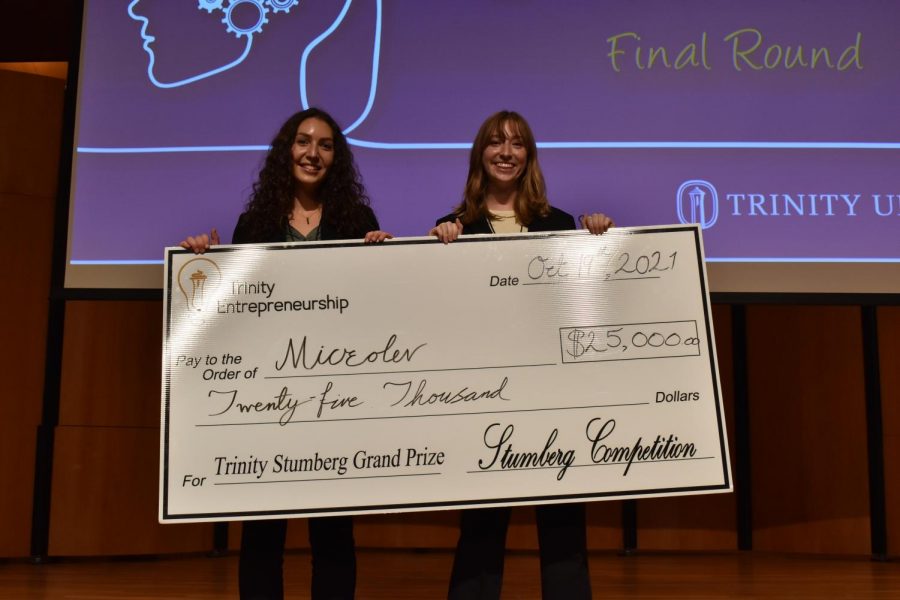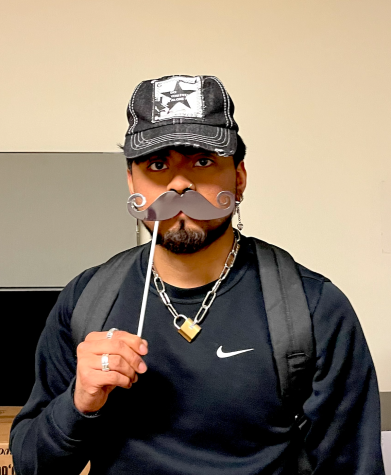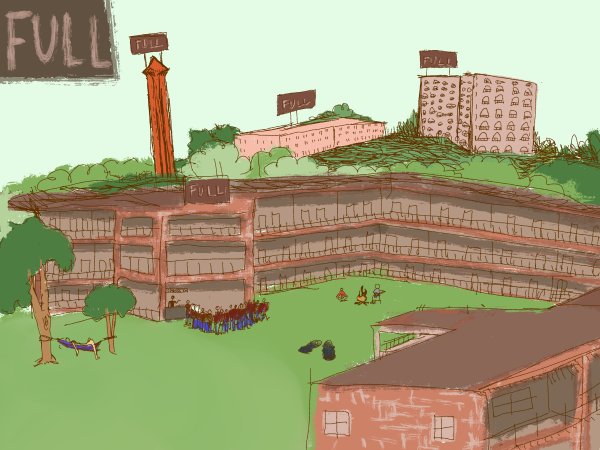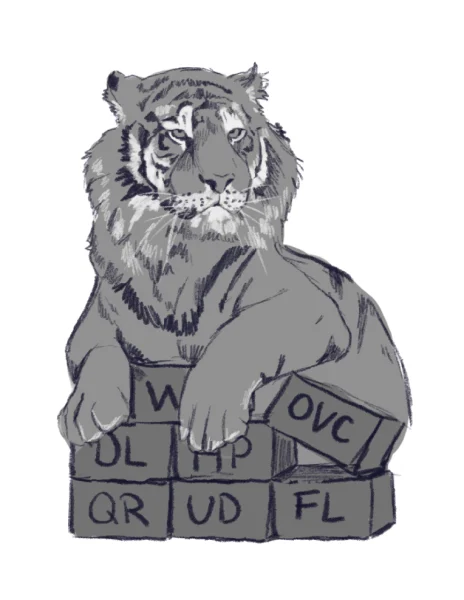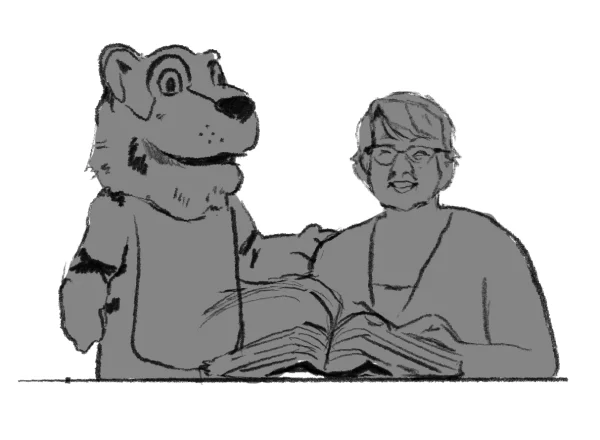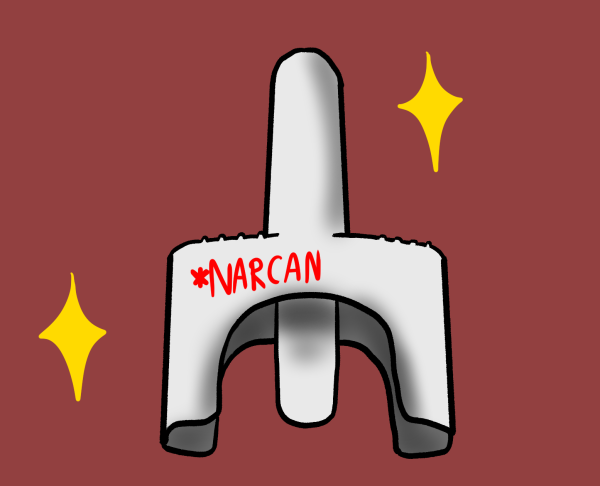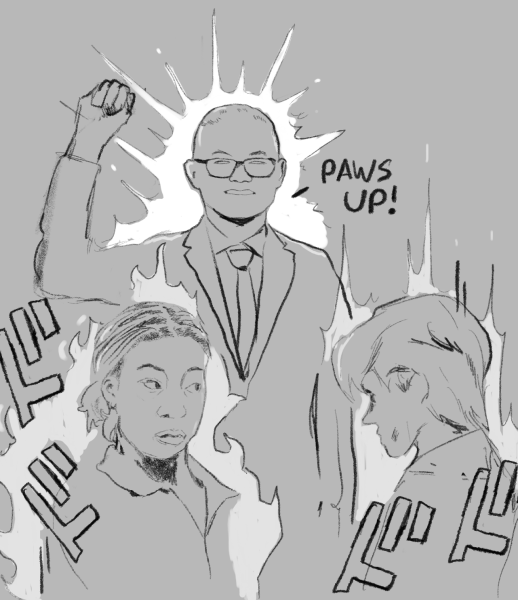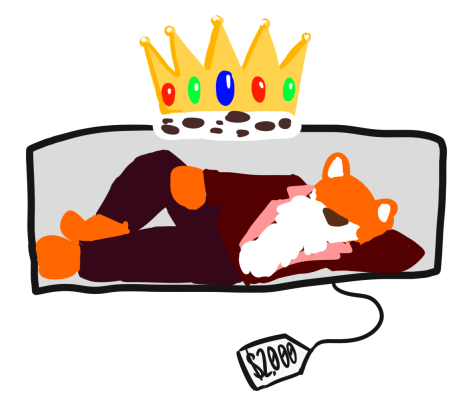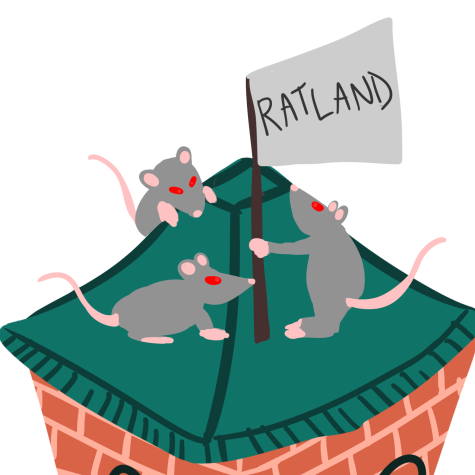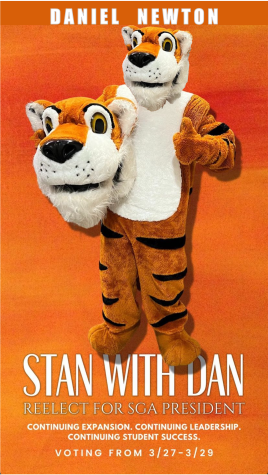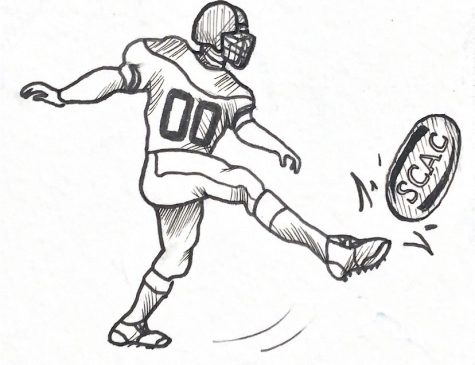MicroLev wins $25,000 in Stumberg Competition
Four student startup teams competed for grand prize in final round of entrepreneurial race
Stumberg Winners Microlev
Four teams stand on the stage, awaiting judgment. They have been working hard to develop a company for the last 11 months, and now the time has finally arrived: the Louis H. Stumberg New Venture Competition finals.
On Oct. 19, four groups of ambitious entrepreneurs entered the final stage of the Stumberg Competition for $25,000. These groups of students have created businesses through a university-funded process known as the Stumberg Competition, which grants them funds, advisors, and classes through a summer accelerator program. This week, the four teams, MicroLev, Commuv, New Works SA, and WakeScoot, gave the final pitch of their company to a group of judges, resulting in one team winning the cash prize.
The competition started in November 2020, where all Trinity students were free to send in their pitches.
“We receive somewhere, depending on the year, from 20 to 40 applications. An independent panel evaluates those and chooses approximately 10 or so to then pitch in our spring seed round, so those teams are announced roughly at the beginning of February,” said Luis Martinez, director of the Center for Innovation and Entrepreneurship.
After March, five of these teams are selected to go through the summer accelerator program.
“They’ll spend the summer with Trinity Entrepreneurship in our version of undergraduate research, so they’ll be living in the dorms, working 40 hours a week on their venture concepts, and they’ll be getting paid a stipend for it,” Martinez said. “They register as a legal entity, either a formal nonprofit or formal for-profit company. They get their bank accounts, they get their legal paperwork, some of them actually start selling or creating the kind of products or services that they wish to do. Others are working further along to develop their business plan.”
Finally, the teams reach the finals, a chance to show how far their companies have come and to win $25,000.
“The teams have been given an investment of $5,000 to start building their company and developing products and services and working through that,” Martinez said. “So the judges are evaluating a variety of things. One of the things that the judges are evaluating is, what did you do with that $5,000 investment? How might you utilize the $25,000 investment to build something else or build more? Their business plan is evaluated [as well as] their projections. As a nonprofit, how are they going to be sustainable? As a for-profit, how are they going with sales with their projections?”
Throughout the past year, these teams have been working hard to develop their own start-ups. Each team brings a unique perspective to this competition. First is New Works SA, run by Wren Ramos, a senior theatre and communication double major, and Taylor Condron, a senior biology major.
“We noticed that it was really hard for a lot of students to get into theatre long term or to feel like it was accessible to them,” Ramos said. “So we created New Works, which is a theatre education nonprofit that goes into disadvantaged schools to teach all aspects of theater and has them create their own show in the hopes of increasing retention and helping them find a community.”
Focused on improving relations between police officers and civilians, senior engineering science major Michael Marquez and junior international business major Jalen White created a technology that makes traffic stops contactless.
“We’re Commuv. Essentially we’re building technology that will be a virtual traffic stop. It will allow drivers and officers to be in a traffic stop that will require neither of them to get out of their vehicles,” Marquez said.
WakeScoot is another team composed of sophomores Carson Byrd, Ryan Arnold, Cannon Starcke, and Alec Townsend. These four created a business based on making an easy-to-use wakeboard.
Finally, is MicroLev, run by Josefina Hajek-Herrera, a senior business management major, Bene Snyder, a senior business analytics and technology major, and Ryan Davis, a professor of chemistry.
“MicroLev develops aerosol research equipment or labs across the U.S. Whether it be environmental aerosol research or analytical chemistry or medication research, you can use our device to test aerosols,” Hajek-Herrera said.
Through this process, these teams learned about the intricacies of building a business but also found a community of other aspiring entrepreneurs on Trinity’s campus.
“I got closer with the other teams and we got to go through this together, which was so valuable. This whole process can be scary, and it was easy to doubt yourself at times, and when you have this community, it’s really supportive, and it reminds you how passionate you are about your work,” Hajek-Herrera said.
Each of the teams is confident about how hard they worked in the competition, but many expressed that even if they don’t win, they still plan to move forward with their companies.
“We’re athletes, so we’re used to the competition, the goal is to win, to succeed. Our coach puts it forward like, ‘You prepare Monday through Friday, and when you go on Saturday, you’ve already won the game,’” said Alec Townsend of WakeScoot. “That’s how we’ve felt because we’ve put so much effort into it, so on Tuesday, it’s like we’ve already won the match.”
On the day of the competition, the teams gave a final pitch to a panel of six judges composed of local entrepreneurs. Teams were evaluated on materials given to the judges beforehand, an eight-minute pitch, and a five-minute question and answer segment. Afterward, students voted on a fan-favorite team, and the judges chose the team that won the cash prize.
WakeScoot was voted the fan favorite.
“I feel like we’re a sore thumb in the competition, and we’re riding that. We wanna make it clear that we’re the fun group; we love to have fun on the water, to have fun with our customers,” Arnold said.
After minutes of deliberation, the judges came out with the winners: MicroLev. The cash prize will allow the team to protect their intellectual property.
“We’re going to file a utility patent, which is a longstanding protection of intellectual property. If you can’t protect this, it could get swept out from under you before your company has a chance to take off,” Snyder said. “And that’s going to take up most of the money, about $14,000.”
The teammates were extremely excited about their win.
“We’ve worked so hard. It’s really nice to see that hard work pay off, but we know that there’s so much potential in MicroLev. This was just another thing that proved to us that we can make it,” Hajek-Herrera said.
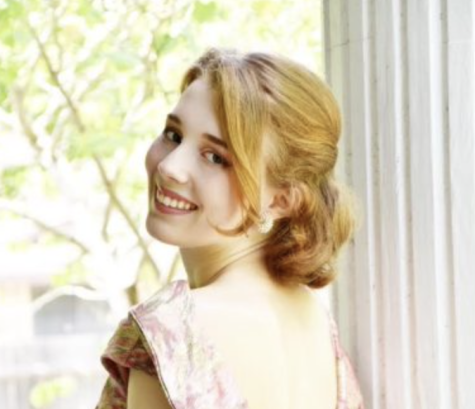
My name is Emma and I am a sophomore from Lockhart, Texas. I have worked at the Trinitonian since Spring 2021. I am an English major and hope to become...
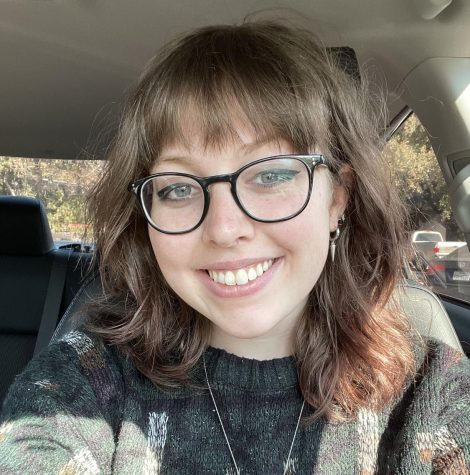
My name is Claire Sammons and I am an Anthropology and Communications double major. I have worked for the Trinitonian since fall of 2020. I became a photographer...

